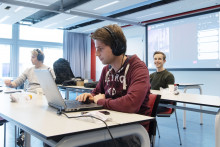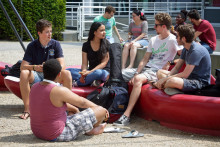Can you summarize what the 1.5 meter education will be all about at the UT?
De Boer: ‘In essence, all the old-fashioned oral lectures will be done online. Tutorials will be partly on campus and partly at home. Teachers will need to split up their material, give students exercises to do at home and offer online consultation, for example. Practicals will go on and happen on campus, but will be spread over the whole day, including evenings. In principle, it should not be more than one evening a week for a student or a teacher. This solution has been agreed upon by the Executive Board and the University Council for the first quarter. After that it will be evaluated. It is a complex situation. We always talk of students, but you also have to think of the lecturers and the supporting staff. To have a practical in the evening, a lot of people need to work that evening – you need the buildings and rooms cleaned, you need the emergency service (BHV) available and so on.’
You have been the contact person since mid-June. What is the most common question you have received so far?
‘People want to go back to campus. Since the 15th of June, people are enjoying more freedom and their most common question for me is: can we go back? But in principle we should have as few people on campus as possible. There is a lot of work done behind the scenes. There is a lot of effort to make everything ready for the 1st of September, and so it is difficult to give effort to allowing people in right now. We only have limited space available. For other questions, people are curious about the interpretation of the guidelines for 1,5 meter education which were published recently. These guidelines ask for reducing education on campus to 20-30% and I help people see how that might be possible.’
What are the biggest challenges programmes are facing with regards to the 1.5 meter education?
‘It differs per programme. Some have problems with practicals, because there are not that many facilities and students need to be split up into small groups. Some programmes are not used to that, they usually work with one group of sixty or seventy students. Larger programmes, on the other hand, are used to having several groups but they have problems with community building. They are searching for possibilities for social gatherings, because students need that to get to know each other and the university. Older students know how the UT works, but the first year students don’t know the culture and can’t learn it only online. Another challenge is the communication. Most people are at home and don’t know which rules apply to them. They receive long emails with updates, but they don’t know what is relevant for them. On top of that, there are a lot of rumors going around – about what is or will be possible on campus. That is what I’m facing.’
What are the main adjustments students and teachers will need to make?
‘The oral lectures will need to be online and lecturers will need to find a way to do that. Tutorials will need to be done differently and teachers will need to ensure that they still get the right interaction, that students can still ask them questions. I’ve heard from students that they miss the “look over their shoulder” sometimes, for example a step by step explanation of mathematical exercises. They are used to the teacher checking up on them as they go along, now that is not possible.’
Do you also see some positives in all these changes?
‘Yes, I think so. The physical interaction and physical education are still important, but with online lectures students can follow them in their own time. They can watch them again, because they are recorded. They can prepare online and then come to tutorials on campus prepared with the right questions.’
I think everyone is curious about how the 1.5 meter education will work in practice. What do you think? Will it work?
‘It must work. I believe it will work because we are now talking about a specific period when these measures need to be in place. At this moment it is for one quarter. Depending on the developments of the national measures due to the corona virus and the experience obtained in the first quarter the second quarter can be scheduled. Everyone is helping and trying to find a way. There are objections – for example against the work in the evenings -, but in the end everyone wants to find a way to physically meet on campus. I believe we will find the right way. The biggest issue is if a second wave comes and there is another lockdown. But as the plan is right now, I think it will work.’








